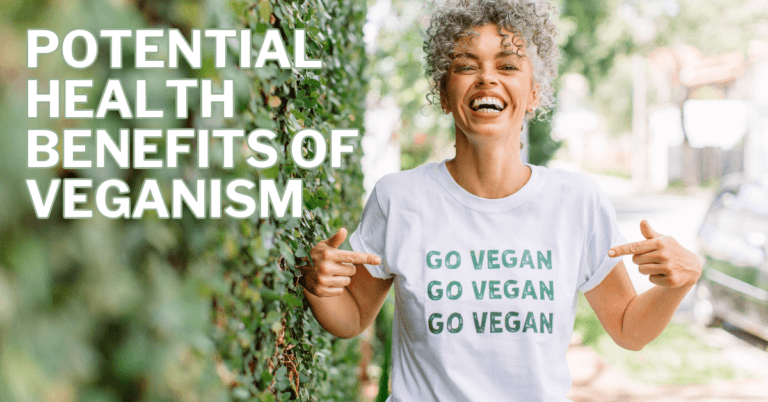Vegan Mindfulness And Mental Well-Being
Vegan Mindfulness And Mental Well-Being
More and more people are turning to mindfulness techniques to improve their mental health and general quality of life in today's hectic and stressful society.
The discipline of mindfulness, or being fully present and aware of the present moment without passing judgment, has grown significantly in popularity in recent years.
Mindfulness may be a potent tool for vegans to deepen their connection to the environment and the welfare of all living things and improve their mental health.
In this article, we'll look at how mindfulness may help vegans in different areas of their lives, from fostering compassion and empathy to easing stress and fostering inner peace.
We'll also look at useful advice and methods vegans may use to incorporate mindfulness into their daily lives and develop stronger awareness, gratitude, and contentment.
Let's go on a journey to learn how combining mindfulness and veganism might result in a more conscious and fulfilling life.

1. Understanding Mindfulness
Mindfulness is fully present, without judgment or attachment to thoughts and emotions. It involves paying deliberate attention to one's thoughts, feelings, physical sensations, and environment.
By cultivating mindfulness, individuals can develop a greater awareness of their thoughts and emotions, allowing them to respond to life's challenges with clarity and compassion.
For vegans, mindfulness can profoundly enhance mental well-being and strengthen their commitment to ethical living.
By being mindful, vegans can fully connect with the ethical principles that led them to adopt a plant-based lifestyle, reinforcing their compassion for animals and the environment.
One of mindfulness's core principles is meditation, which involves focusing on the breath or a specific object while acknowledging and gently redirecting any wandering thoughts.
Meditation can help vegans better understand their ethical choices and cultivate self-compassion, promoting a more balanced and positive outlook.
Deep breathing exercises are another essential aspect of mindfulness. By focusing on their breath, vegans can ground themselves in moments of stress or emotional turmoil, allowing them to respond with greater clarity and compassion to challenges they may encounter in advocating for animal rights and environmental issues.
Body awareness, which involves paying attention to physical sensations, can help vegans reconnect with their bodies and foster a more profound gratitude for the nourishment and energy they receive from their plant-based diet.
Overall, mindfulness can empower vegans to navigate the complexities of their lifestyle with greater emotional resilience, promote self-care and well-being, and contribute to a more profound and meaningful connection with their ethical values.
By incorporating mindfulness practices such as meditation, deep breathing, and body awareness into their daily lives, vegans can reap numerous benefits for mental well-being and ethical living.
2. Benefits Of Mindfulness And Mental Well-Being
Mindfulness offers a wide range of benefits for mental well-being, regardless of one's dietary choices. For vegans, incorporating mindfulness practices into their lives can amplify these advantages and align with their ethical values.
Mindfulness practices, such as meditation and deep breathing exercises, have lowered stress levels and reduced anxiety symptoms.
By focusing on the present moment and letting go of worries about the past or future, vegans can cultivate a sense of calm and inner peace.
Mindfulness encourages a non-judgmental and open-hearted approach to oneself and others.
For vegans, this can foster a deeper connection to the well-being of all living beings, leading to increased empathy and compassion for animals and the environment.
Regular mindfulness practice can enhance cognitive function and improve focus and concentration.
For vegans who may be engaged in advocacy or activism, improved engagement can be beneficial for effectively communicating their values and promoting positive change.
Mindfulness helps individuals become more aware of their emotions and responses to various situations.
This heightened emotional intelligence allows vegans to navigate challenging situations with greater self-awareness and make conscious decisions aligned with their values.
By being present and appreciating the simple joys of life, vegans can cultivate a sense of gratitude and contentment.
This can contribute to a more positive outlook and greater overall well-being.
Mindfulness practices are effective in reducing symptoms of depression and enhancing overall mood. For vegans facing challenges or emotional distress related to animal welfare, mindfulness can be a valuable tool for emotional healing.
Mindfulness techniques, such as relaxation exercises, can promote better sleep quality. Adequate rest is crucial for mental health and overall vitality, supporting vegans in leading fulfilling and purposeful lives.
Incorporating mindfulness into daily routines can be a transformative journey for vegans, enriching their mental well-being and strengthening their commitment to compassionate living.
With regular practice, vegans can experience these benefits firsthand and foster a deeper connection to themselves, others, and the world around them.

3. The Link Between Veganism And Mental Well-Being
The link between veganism and mental well-being is multifaceted and can be influenced by several psychological factors.
Adopting a vegan lifestyle often stems from a strong sense of ethics and compassion for animals, which can lead to feelings of purpose and alignment with one's values.
Making conscious choices to avoid animal exploitation and promote environmental sustainability may foster a sense of empowerment and fulfillment, contributing to overall psychological well-being.
Vegans often report experiencing reduced stress and anxiety levels as their dietary choices align with their moral principles, leading to reduced cognitive dissonance.
Moreover, the plant-based diet itself may play a role in improving mental health. According to some studies, a diet high in fruits, vegetables, and whole grains, typical of vegan diets, may be linked to a lower incidence of sadness and anxiety.
Additionally, engaging in ethical veganism can foster community and social support.
Joining like-minded individuals in vegan activism or participating in animal rights initiatives can lead to a sense of belonging and camaraderie, promoting positive mental health outcomes.
However, it is essential to acknowledge that veganism, like any lifestyle choice, can also present challenges, such as social pressures, dietary concerns, and feelings of isolation.
Awareness of and addressing these challenges through mindfulness practices can further enhance the mental well-being of vegans.
Mindfulness techniques, such as meditation and self-compassion exercises, can help vegans navigate these difficulties with greater resilience and emotional regulation.
Adopting a vegan lifestyle is often deeply rooted in ethical considerations, environmental consciousness, and compassion for all living beings.
These principles, combined with the potential health benefits of a plant-based diet, contribute to improved mental well-being for many vegans.
By cultivating mindfulness and self-awareness, individuals can navigate the challenges and complexities of veganism while experiencing greater emotional balance and fulfillment in their lives.

4. Mindfulness And Vegan Advocacy
Mindfulness is crucial in supporting vegans engaged in advocacy and activism by fostering effective communication, reducing burnout, and enhancing resilience.
Advocating for animal rights and environmental issues can be emotionally taxing, as it involves confronting challenging realities and engaging in discussions that may be met with resistance or skepticism.
Mindfulness practices, such as meditation and self-compassion exercises, can help advocates stay present in the moment and manage their emotional responses when faced with difficult situations.
By cultivating mindful communication, advocates can engage in more constructive dialogues with others, even those with opposing viewpoints.
Mindfulness encourages active listening, empathy, and non-reactive responses, allowing advocates to effectively convey their message without becoming defensive or aggressive.
This approach can promote a more open and receptive exchange of ideas, potentially leading to greater understanding and awareness.
Furthermore, mindfulness can act as a buffer against burnout, a common concern among vegan advocates passionately committed to their causes.
Mindfulness practices can help advocates recognize emotional exhaustion and implement self-care strategies to prevent burnout.
Mindfulness also encourages self-compassion, reminding advocates to be kind to themselves and acknowledging that progress in advocacy efforts may be gradual.
Mindfulness enhances resilience in facing challenges and setbacks, allowing advocates to bounce back from disappointments and setbacks with renewed determination.
It encourages a growth mindset, where advocates view obstacles as opportunities for learning and growth rather than insurmountable barriers.
Integrating mindfulness practices in vegan advocacy can significantly benefit advocates and the causes they champion.
By cultivating mindful communication, managing emotional well-being, and building resilience, advocates can navigate the complexities of advocacy more effectively and sustain their commitment to animal rights and environmental issues for the long term.
5. Mindfulness And Emotional Resilience
Mindfulness is pivotal in cultivating resilience for vegans navigating the emotional challenges of living in a non-vegan world.
In a society where veganism may be met with resistance, misunderstanding, or even ridicule, vegans need to develop emotional resilience to maintain their commitment to their values and prevent feeling overwhelmed or burned out.
Mindfulness techniques offer valuable tools for coping with distressing situations. Through mindfulness meditation, vegans can develop a non-reactive awareness of their emotions, allowing them to observe and acknowledge their feelings without being consumed.
This non-judgmental awareness helps in reducing emotional reactivity and enhances emotional regulation, enabling vegans to respond to difficult situations with greater composure and clarity.
Mindfulness also helps vegans stay grounded in their personal values and ethical beliefs. By regularly engaging in mindfulness practices, vegans reinforce their connection to their underlying principles, reminding themselves of their reasons for choosing a compassionate lifestyle.
This alignment with their values provides a sense of purpose and meaning, which can be particularly important during challenging times when societal pressures or cultural norms may clash with their ethical choices.
Moreover, mindfulness encourages self-compassion, allowing vegans to be kind and understanding towards themselves when facing adversities or criticism.
Self-compassion counteracts feelings of self-blame or guilt that may arise due to the inevitable imperfections or limitations of advocating for veganism in an imperfect world.
By incorporating mindfulness into their lives, vegans can develop emotional resilience that supports staying true to their values, navigating the emotional complexities of non-vegan environments, and engaging in advocacy with greater clarity and authenticity.
Ultimately, mindfulness empowers vegans to face challenges with a sense of emotional balance and inner strength, fostering long-term sustainability in their commitment to compassion and ethical living.

6. Mindfulness And Compassionate Living
Mindfulness practices go beyond dietary choices and can significantly influence a more compassionate lifestyle in various aspects of daily life.
Individuals can foster a greater sense of kindness and sustainability by extending mindfulness to relationships, consumption habits, and other interactions.
In relationships, mindfulness enhances empathy and deepens connections with others. By being fully present and attentive during interactions, individuals can better understand the emotions and experiences of those around them.
This understanding leads to more compassionate responses, fostering a supportive and nurturing environment for friends and strangers.
Mindfulness also impacts consumption habits, encouraging conscious and sustainable choices. Individuals become more mindful consumers by cultivating awareness of products' environmental and ethical implications.
They may opt for cruelty-free and environmentally friendly options, reducing their ecological footprint and contributing to a more compassionate world.
Moreover, mindfulness promotes gratitude and contentment, helping individuals recognize and appreciate the abundance in their lives.
As a result, the desire for excessive material possessions decreases, encouraging a more minimalist and sustainable approach to consumption.
Additionally, mindfulness encourages a non-judgmental attitude toward oneself and others. This self-compassion enables individuals to embrace imperfections, cultivating an accepting and forgiving mindset.
Such self-compassion extends to others, fostering an environment of understanding and kindness in which everyone's journey is respected and supported.
By integrating mindfulness into various aspects of daily life, individuals can create a ripple effect of compassion and sustainability.
Mindful living promotes a deeper connection with oneself, others, and the environment, resulting in more conscious choices that align with the values of kindness, empathy, and environmental stewardship.
In this way, mindfulness becomes a powerful catalyst for a more compassionate lifestyle that extends beyond diet and positively impacts the world.
7. Creating A Mindful Vegan Lifestyle
Creating a mindful vegan lifestyle involves cultivating awareness and compassion in daily routines and interactions. Start with simple techniques like breath awareness or guided meditations to establish a mindfulness practice.
Set aside dedicated time each day for mindfulness exercises, gradually increasing the duration as you become more comfortable.
Utilize resources such as mindfulness apps, online courses, or books to deepen your understanding and practice. Engaging in a vegan mindfulness community or attending meditation groups can provide support and inspiration for your journey.
Integrating mindfulness into everyday activities begins with being fully present and engaged in the present moment.
During mealtime, savour the flavours and textures of plant-based dishes, appreciating the nourishment they provide to your body.
When grocery shopping, practice mindful awareness of your choices, considering your selected products' ethical and environmental impacts.
Practice active listening and empathetic understanding during interactions to foster meaningful connections. Engage in mindful movement through activities like yoga or nature walks, appreciating the relationship between your body and the environment.
Using mindfulness to navigate challenges in the vegan lifestyle involves responding with non-reactive awareness. When facing criticism or conflicts, practice self-compassion and acknowledge your emotions without judgment.
Cultivate patience and resilience, recognizing that progress towards a compassionate world takes time and effort.
When advocating for animal rights and environmental causes, maintain mindfulness to effectively communicate your message with empathy and understanding.
A mindful vegan lifestyle ultimately harmonizes ethical and compassionate choices with intentional living.
Integrating mindfulness into your daily practices and interactions can deepen your connection to yourself, others, and the world around you.
Through mindfulness, you foster a profound sense of compassion and purpose in your vegan journey, promoting well-being for yourself and the planet.

8. Coping With Vegan-Related Challenges
Vegans often encounter challenges in a society that may not fully understand or support their ethical choices.
Social pressures, criticism, and feelings of isolation can be overwhelming, impacting their mental well-being. Mindfulness practices offer valuable tools for coping with these difficulties and fostering resilience.
When faced with social pressures, mindfulness helps individuals stay grounded in their values, allowing them to respond with calmness and clarity rather than react impulsively.
By cultivating self-awareness, vegans can understand their emotional responses and triggers, making it easier to address negative thoughts or feelings constructively.
Mindfulness practices also promote self-compassion, encouraging vegans to treat themselves with kindness when faced with criticism or judgment.
Through self-compassion, individuals can build emotional strength and not internalize external negativity.
Mindfulness enables vegans to find community and support by connecting with like-minded individuals and organizations.
Engaging in mindful communication allows for more meaningful dialogues with others, creating opportunities for positive change and understanding.
Mindfulness helps vegans embrace the present moment, reducing anxiety about future challenges or regrets about the past.
It fosters a sense of acceptance and peace, enabling individuals to focus on their personal growth and advocacy efforts.
When faced with feelings of isolation, mindfulness can serve as a refuge, reminding vegans of their interconnectedness with all beings and the planet.
Mindfulness practices provide a powerful foundation for vegans to navigate challenges with grace, self-compassion, and resilience.
By applying mindfulness in their daily lives, vegans can foster a deeper understanding of themselves and others, promote positive change, and maintain their commitment to compassionate living, even in the face of adversity.
Conclusion
In conclusion, integrating mindfulness into a vegan lifestyle offers numerous mental well-being and happiness benefits.
Mindfulness practices provide individuals with the tools to cultivate self-awareness, emotional resilience, and compassion, essential for navigating the challenges of living in a non-vegan world.
Through mindfulness, vegans can deepen their connection to their values, enabling them to respond to social pressures with grace and assertiveness.
Mindfulness encourages self-compassion, fostering a kinder and more accepting relationship with oneself and others.
Through mindfulness, vegans can also enhance their advocacy efforts, engaging in more effective and empathetic communication with others.
By remaining grounded in their values and cultivating emotional resilience, vegans can navigate their unique challenges with greater strength and self-assurance.
Mindfulness is a transformative practice that empowers vegans to lead a compassionate lifestyle while fostering mental well-being and emotional balance.
As vegans embrace mindfulness, they contribute to personal growth and happiness, inspire positive change, and promote a more compassionate world for all living beings.
I trust you enjoyed this article about Vegan Mindfulness And Mental Well-Being. Please stay tuned for more blog posts to come shortly. Take care!
JeannetteZ
>>>Please click here to read my Vegan Travel Guides To World Destinations<<<
>>>Want To Learn How To Create Delicious, Cruelty-Free, Healthy AND 100% Vegan Meals? Try These Awesome Vegan Cooking Courses With A Free 7-DAY MEMBERSHIP<<<
Your Opinion Is Important To Me
Ideas? Thoughts? Questions? I would love to hear from you. Please leave me your questions, experience, and remarks about the Vegan Mindfulness And Mental Well-Being article in the comments section below. You can also reach me by email at Jeannette@LivingTheVeganLifestyle.org.
Disclosure
This post may contain affiliate links. I earn from qualifying purchases as an Amazon Associate and other affiliate programs. Please read my full disclosure.
Here are links to some of my favourite articles:
Best Vegan Fitness Tips And Workout Routines
Best Eco-Friendly Cleaning Hacks
Potential Health Benefits Of Veganism
Best Vegan Guide To Clothing And Apparel







